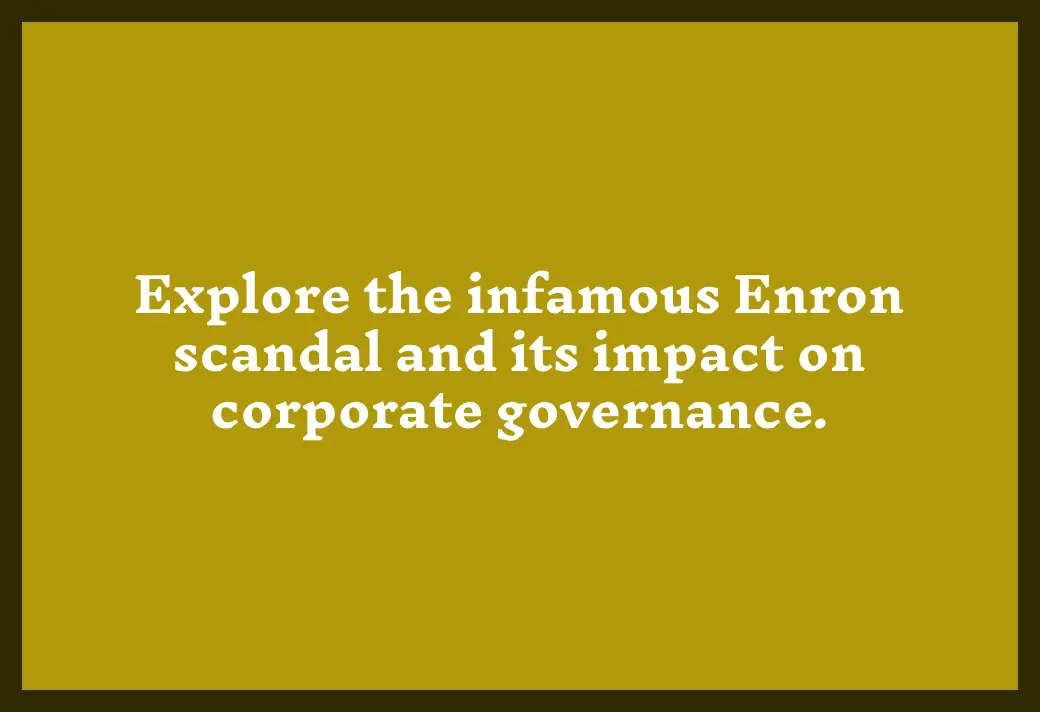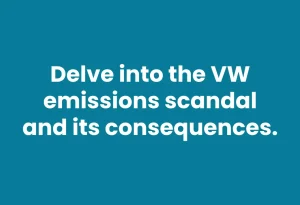Corporate governance is the system of rules, practices, and processes by which a company is directed and controlled. It is the framework that defines the relationship between a company’s management, its board of directors, its shareholders, and other stakeholders.
However, in recent years, several high-profile corporate scandals have shaken the foundation of corporate governance and brought to light the unethical and fraudulent practices that can occur within companies. One such scandal that continues to be at the forefront of discussions is the infamous Enron scandal.
This scandal, which unfolded in the early 2000s, was a result of widespread corruption and accounting fraud within the energy company, leading to its eventual downfall. The impact of the Enron scandal on corporate governance has been far-reaching, causing a shift in the way companies are managed and regulated, and highlighting the need for increased transparency and accountability.
In this article, we will explore the Enron scandal in-depth, analyzing its key players, how it unfolded, and the lasting impact it has had on the world of corporate governance.
Earn a certificate in your dream career for an affordable price at IAP Career College today!
Corporate greed leads to downfall
The Enron scandal serves as a stark reminder of the destructive consequences that can arise from corporate greed. The unraveling of this once prominent energy company revealed a web of deceit, corruption, and unethical practices that ultimately led to its downfall.
Enron’s executives, driven by relentless pursuit of profit and personal gain, manipulated financial statements, engaged in fraudulent activities, and abused their positions of power. This egregious display of corporate greed not only resulted in massive financial losses and bankruptcy, but it also shattered the trust of investors and stakeholders, eroding the very foundation of corporate governance.
The Enron scandal serves as a cautionary tale, highlighting the importance of ethical leadership, transparency, and accountability to safeguard the integrity and sustainability of corporations.
Enron’s fraudulent accounting practices uncovered
The Enron scandal sent shockwaves through the corporate world as the extent of its fraudulent accounting practices was uncovered. Investigations revealed a complex web of deceit and manipulation, orchestrated by top executives in an attempt to inflate the company’s financial performance and mislead investors.
Enron employed a range of deceptive tactics, such as creating off-balance-sheet entities, engaging in round-trip trades, and manipulating energy prices. These practices allowed Enron to portray a false image of prosperity and profitability, while concealing massive debts and losses.
The discovery of these fraudulent activities not only led to the collapse of Enron but also exposed significant weaknesses in corporate governance and regulatory oversight. It served as a wake-up call for the need for greater transparency, accountability, and ethical standards within the corporate world.
Investors lose billions, employees lose jobs
The repercussions of the Enron scandal were far-reaching, resulting in immense financial losses for investors and devastating consequences for employees. As the truth behind Enron’s fraudulent practices emerged, investors saw their hard-earned money evaporate, with billions of dollars wiped out from the company’s stock value.
This financial devastation had a ripple effect, impacting pensions, retirement savings, and investment portfolios of individuals who had placed their trust in Enron’s seemingly thriving business. Furthermore, the collapse of Enron led to a wave of job losses, leaving thousands of employees without employment or a means to support themselves and their families.
The Enron scandal serves as a stark reminder of the catastrophic consequences that can arise from corporate misconduct, underscoring the importance of effective corporate governance and regulatory mechanisms to safeguard against such abuses.
Confidence in corporate ethics shattered
The Enron scandal shattered confidence in corporate ethics, leaving a lasting impact on the perception of business practices. The revelation of Enron’s widespread deception and manipulation was a wake-up call for the corporate world, exposing the dark underbelly of greed and unethical behavior.
The scandal highlighted the urgent need for stronger regulations, transparency, and accountability to prevent similar exploitations in the future. Stakeholders, including investors, employees, and the general public, were left disillusioned and skeptical of corporate integrity, questioning the very foundation of trust that underpins the business world.
Rebuilding confidence in corporate ethics requires a concerted effort from both regulatory bodies and corporations themselves to prioritize ethical decision-making, integrity, and responsible practices to restore faith in the system and ensure a sustainable and trustworthy business environment.
Government intervenes, investigations ensue
In response to the Enron scandal, government intervention became a necessary step to uncover the extent of corruption and restore public trust. Government agencies, such as the Securities and Exchange Commission (SEC), launched extensive investigations to unravel the complex web of fraudulent practices perpetrated by Enron executives.
These investigations aimed to hold accountable those responsible for the scandal and to identify systemic weaknesses in corporate governance that allowed such abuses to occur. As the investigations progressed, evidence was gathered, witness testimonies were taken, and a clearer picture emerged of the unethical actions that led to Enron’s downfall.
The involvement of the government in these investigations served as a signal to the business community that fraudulent activities would not be tolerated, and that rigorous measures would be taken to prevent future occurrences. The Enron scandal, therefore, prompted a heightened focus on regulatory oversight and enforcement to safeguard the integrity of the corporate world.
Such interventions were vital in restoring confidence and ensuring that ethical standards were upheld in corporate governance moving forward.
Executives found guilty, sentenced to prison
Several high-ranking executives involved in the Enron scandal have faced the consequences of their actions with criminal convictions and subsequent prison sentences. These individuals, who held influential positions within the company, were found guilty of various charges including securities fraud, insider trading, and obstruction of justice.
The legal proceedings surrounding the Enron scandal were meticulously conducted, with prosecutors presenting compelling evidence and witness testimonies that exposed the extent of the executives’ involvement in the fraudulent activities.
The sentencing of these individuals to prison sends a strong message that corporate misconduct will be met with severe repercussions, reinforcing the importance of ethical behavior and accountability in corporate governance. Such cases serve as a stark reminder of the need for robust regulatory measures and oversight to ensure the integrity and trustworthiness of the corporate sector.
Enron scandal sparks legislative changes
In the aftermath of the Enron scandal, the corporate world witnessed a significant shift in legislative and regulatory frameworks. The shocking revelations of widespread corporate fraud and the devastating impact it had on shareholders and employees prompted lawmakers to take swift action to prevent such egregious misconduct in the future.
Governments implemented reforms aimed at enhancing transparency, accountability, and corporate governance practices. These legislative changes included stricter regulations on financial reporting, improved disclosure requirements, and enhanced oversight of corporate activities.
The Enron scandal served as a wake-up call, highlighting the vulnerabilities in the existing regulatory framework and necessitating a comprehensive overhaul to restore public trust in the corporate sector. As a result, legislative changes were instrumental in reshaping the corporate landscape by placing a greater emphasis on ethical conduct, risk management, and responsible decision-making.
Corporate governance practices under scrutiny
The Enron scandal served as a catalyst for heightened scrutiny of corporate governance practices across industries. Stakeholders and investors became acutely aware of the potential risks associated with lax oversight and inadequate checks and balances within organizations.
In response, corporate leaders and boards of directors faced increasing pressure to strengthen their governance frameworks, ensuring transparency, accountability, and ethical decision-making. This scrutiny led to the implementation of robust internal control systems, independent audit committees, and improved risk management processes.
Companies began to prioritize effective board composition, including diverse skills and experiences, to enhance oversight and mitigate conflicts of interest. Additionally, whistleblower protections and mechanisms for reporting unethical behavior were established to encourage a culture of integrity and responsible business practices.
As a result, corporate governance practices underwent significant transformation, with a renewed commitment to upholding the highest standards of accountability and ethical conduct.
Trust in corporations eroded further
Trust in corporations eroded further as the Enron scandal exposed the depths of corporate misconduct and deception. This high-profile case shattered the confidence of investors and the public alike, highlighting the urgent need for stricter oversight and accountability measures.
The deliberate manipulation of financial statements and the subsequent bankruptcy of Enron sent shockwaves through the business world, raising serious concerns about the integrity of corporate leaders and the effectiveness of existing regulatory frameworks.
The fallout from the scandal led to a wave of skepticism towards corporate motives and practices, causing stakeholders to question the reliability of financial reporting and the ethical conduct of business executives.
This erosion of trust has had far-reaching implications for corporations, necessitating a renewed commitment to transparency, ethical decision-making, and restoring faith in corporate governance systems. In the aftermath of the Enron scandal, rebuilding trust became an imperative for corporations seeking to regain the confidence of shareholders, investors, and the general public.
Lessons learned, cautionary tale remains
The Enron scandal serves as a stark reminder of the devastating consequences that can arise from unchecked corporate greed and unethical behavior. It serves as a cautionary tale for businesses of all sizes to prioritize transparency, accountability, and strong corporate governance practices.
The lessons learned from the Enron scandal are clear: the importance of maintaining integrity in financial reporting, the need for robust internal controls, and the crucial role of independent oversight bodies. By implementing sound governance structures and fostering a culture of ethical conduct, organizations can strive to prevent similar catastrophic events and safeguard the trust and confidence of their stakeholders.
As we continue to explore the infamous Enron scandal and its impact on corporate governance, it is essential that we use these lessons as a guiding force in shaping a future where integrity and ethical business practices prevail.
Conclusion: Lessons from the Enron Scandal
In conclusion, the Enron scandal serves as a stark reminder of the importance of ethical business practices and strong corporate governance.
It shed light on the potential consequences of unchecked greed and corruption within a company. The aftermath of the scandal brought about significant changes in corporate governance laws and regulations, with the goal of preventing similar scandals from occurring in the future.
As we continue to navigate the ever-evolving landscape of business, let us remember the lessons learned from Enron and strive for transparency, accountability, and ethical decision-making in all aspects of corporate governance.





